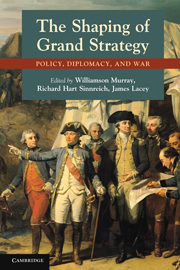Book contents
- Frontmatter
- Contents
- Contributors
- 1 Thoughts on grand strategy
- 2 The grand strategy of the grand siècle: Learning from the wars of Louis XIV
- 3 Strategic culture and the Seven Years' War
- 4 Strategy as character: Bismarck and the Prusso-German question, 1862–1878
- 5 About turn: British strategic transformation from Salisbury to Grey
- 6 British grand strategy, 1933–1942
- 7 Toward a strategy: Creating an American strategy for global war, 1940–1943
- 8 Harry S. Truman and the forming of American grand strategy in the Cold War, 1945–1953
- 9 Patterns of grand strategy
- Index
- References
3 - Strategic culture and the Seven Years' War
Published online by Cambridge University Press: 05 June 2012
- Frontmatter
- Contents
- Contributors
- 1 Thoughts on grand strategy
- 2 The grand strategy of the grand siècle: Learning from the wars of Louis XIV
- 3 Strategic culture and the Seven Years' War
- 4 Strategy as character: Bismarck and the Prusso-German question, 1862–1878
- 5 About turn: British strategic transformation from Salisbury to Grey
- 6 British grand strategy, 1933–1942
- 7 Toward a strategy: Creating an American strategy for global war, 1940–1943
- 8 Harry S. Truman and the forming of American grand strategy in the Cold War, 1945–1953
- 9 Patterns of grand strategy
- Index
- References
Summary
In this essay, strategic culture emerges from the complex political situation of mid-eighteenth-century Britain as a key public mythos. This is at variance with its more common use in the literature as the context within which military tasks were “shaped.” The latter usage reflects discussion of distinctive ways of war and draws on the authority of cultural interpretations of warfare. However, the concept of strategic culture also has to address the issue of coherence and consistency in the face of the contested character of actual national interests, the ferocity of debate and the roles of politics and contingency. In short, there is a revenge of history on theory.
The very existence of strategy, strategic culture and strategic policy in the eighteenth century is highly problematic as far as some well-informed scholars are concerned. They hold this delay in the development of the idea of strategy as reflecting the conceptual and institutional limitations of the time. However, such an approach mistakes the absence of an articulated school of strategic thinking for a lack of strategic awareness. For example, as far as the Royal Navy was concerned, there was considerable experience in balancing resources among tasks. One can see this in the detachment of squadrons from home waters for operational tasks in the Baltic and Mediterranean. Moreover, a strategy of commercial interdiction played a major role in British operations against the Dutch in the late seventeenth century, and later, in the Anglo-Spanish crisis of 1725–1727, it included a powerful transoceanic dimension.
- Type
- Chapter
- Information
- The Shaping of Grand StrategyPolicy, Diplomacy, and War, pp. 63 - 78Publisher: Cambridge University PressPrint publication year: 2011



